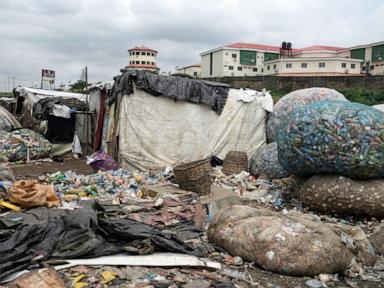Lagos Bans Single-Use Plastics Amid Growing Pollution Crisis

Authorities in Lagos, Nigeria, have enacted a ban on single-use plastics in response to the city’s staggering pollution levels. The law, which took effect on July 1, 2024, prohibits the use of items such as plastic cutlery, plates, and straws. Despite this significant step toward addressing the issue, residents express skepticism over the ban’s effectiveness due to weak enforcement and a lack of affordable alternatives.
With over 20 million residents, Lagos contributes approximately 870,000 tons of plastic waste annually, part of a global total of 57 million tons. Shop manager Olarewanju Ogunbona highlights the common use of Styrofoam and plastic packs, noting he relies on them at least five times daily. “Sellers are still using it very well,” Ogunbona stated, as he continues to purchase meals packaged in Styrofoam.
Challenges in Implementation
The ban, while a notable initiative, faces significant challenges. Many shops still display Styrofoam products, and the overall compliance remains low. The Lagos state government has yet to provide a comprehensive response to queries about enforcement measures. Environmental activists, including Olumide Idowu, express doubts about the ban’s impact without stringent enforcement, affordable alternatives for low-income vendors, and improvements in the city’s overwhelmed waste management systems.
Currently, Lagos generates at least 13,000 tons of waste daily, with plastics accounting for nearly one-fifth of this total. Inadequate waste management systems result in much of this waste entering waterways, creating blockages in canals, polluting beaches, and exacerbating flooding issues.
Efforts to Combat Plastic Pollution
As global discussions on plastic pollution continue, with negotiations currently taking place in Geneva, local initiatives are emerging to address the crisis. Private waste management companies and sustainability groups are gaining traction in Lagos, striving to mitigate the effects of plastic waste.
At a sorting site in Obalende, a commercial suburb near the upscale Ikoyi neighborhood, informal waste collectors work diligently to recycle plastics. Two women at this site shared their experiences, describing how competition has intensified as more individuals join the effort. They can earn around 5,000 naira (approximately $3.26) a day through their labor.
Manufacturers play a crucial role in solving the plastic waste dilemma, according to Omoh Alokwe, co-founder of the Street Waste Company. He emphasized the need for companies to establish systems for collecting and recycling the plastics they produce. “They need to ensure that the plastics being produced into the environment are collected back and recycled,” Alokwe stated.
For the ban on single-use plastics to be truly effective, experts urge a shift in behavior among Lagos residents. Ogunbona points out that without viable alternatives, the reliance on single-use plastics will persist. Addressing the urgent need for solutions, he added, “We will keep using them,” unless other options become available.
As Lagos navigates this complex issue, the path forward will require collaboration between government, businesses, and citizens to cultivate a more sustainable approach to waste management and plastic use.






